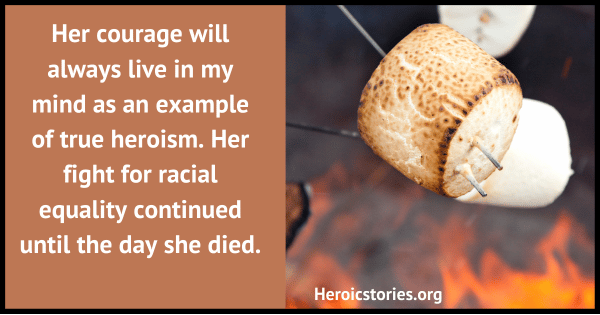by Lauri Goff
Oklahoma City, Oklahoma, USA

In 1965, racism was still rampant in Jackson, Mississippi. Civil rights workers from the north had descended upon the state, and the Ku Klux Klan was at its most active since the turn of the century. A lone white woman, Joan, pledged to do her part to make a difference in her world.
Joan decided to help start the first Head Start program in the state. This program was to prepare young black children to start first grade. During this time, she became passionately involved in the civil rights movement. She marched with Dr. King and demonstrated with protesters against segregation. Her husband, a southerner, was supportive of her efforts.
Joan sparked an interest in her young daughters in the “cause”. They went everywhere with her, including the marches and demonstrations. She became known in all circles as that “white lady” who helped “the darkies.”
One hot summer night when Joan’s husband was out of town on business, Joan and her two girls were relaxing in their family room. The air was still and sultry, broken only by the constant chirp of cicadas and the occasional far-off barking dog. Suddenly, the slam of car doors and gruff voices shouting shattered the sleepy stillness. Honking horns and loud curses disturbed the suburban neighborhood. As a brick came flying through the plate-glass window, Joan rushed to the front door. Her front yard was filled with men in white hoods! They had erected an old wooden cross in the middle of the grass. She flung open the door, and in as growly of a voice as she could muster, the petite woman shouted, “Leave my home, you bastards!” They hurriedly set fire to the cross on the lawn and fled like faceless cowards into the night.
Joan could see the neighbors peeping out from behind their Venetian blinds. She grabbed some marshmallows from the kitchen and told her oldest daughter to get some coat hangers they had used for a previous cookout. With her two blond-haired children in tow, she marched out to the front yard and proceeded to roast marshmallows by the hate-fueled fire. Slowly, quietly, one neighbor after another joined her small family. The adults whispered quietly, hugging and murmuring as children cavorted around the fire. The blaze that had been started by bigots was being extinguished by support and love.
Joan was my mom and I her eldest daughter. Her courage will always live in my mind as an example of true heroism. Her fight for racial equality continued until the day she died.
Available in The Best of HeroicStories, Volume 1.
Podcast: Play in new window | Download (Duration: 3:56 — 4.8MB)


A beautiful story, challenging and inspiring for all of us who care to aspire to humanity. Thank you, Joan.
What an amazing mother you were lucky to have. She must have been an inspiration for her entire life to so many and you sound as though you have picked up all the lessons she taught you and passed that inspiration onto others.
I grew up in the North during that time. I remember asking my father why these men wore hoods, and his answer was, “Because they’re not worth a [bleep] as individuals and they’re scared to be seen for what they are.”
While I admire my parents for fighting some small battles in our area (and winning), I can’t imagine the constant pressure your mother had to face. Few had the courage your mother had back then, and fewer have it now.
Marshmallows. What an inspired way to respond to hate.
I grew up in South Africa during the height of the Apartheid era. Many Black Africans traveled back and forth from the segregated townships where they lived to work in Johannesburg. The buses were crowded beyond belief and there were not enough of them. And then the bus service raised the fare from four to five pennies, a 25% increase, which for these already impoverished people was untenable. Thus began the 1957 Bus Boycott that lasted for 4 months during which people walked 18 – 22 miles each way, rather than pay the extra fare. White South Africans rallied to become the free taxi service and every morning and every night, hundreds of cars made themselves available to ferry the people of the townships to work and back. Eventually the boycotters were successful and the fares were restored to their former price and other conditions were met. I was proud to have been the daughter of a white family that cared enough to help.